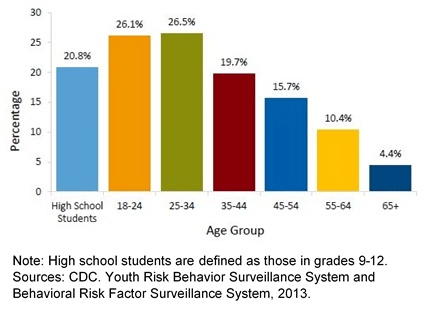There is a public health crisis plaguing the U.S. once again, binge drinking. People who binge drink may not do so during the regular weekdays, but may consume excessive amounts over the weekend. Binge drinking is the third leading cause of preventable deaths in the U.S. An estimated 88,000 people die from excessive alcohol use each year.
In 1998, the National Institute on Alcohol Abuse and Alcoholism (NIAAA) gathered a task force to solve problems related to binge drinking in college. They analyzed behaviors of college students between the ages of 18 and 24 years of age. Their 2002 study found that from 1999 to 2005, the percentage of college students who reported binge drinking rose from 42 percent to 45 percent. These numbers then declined to 37 percent by 2014. These improved statistics seemed promising, but another demographic became an even greater cause for concern.
Recently, binge drinking for non-college young adults has increased from 36 percent to 40 percent. Young men are twice more likely to binge drink than young women according to the Centers for Disease Control and Prevention (CDC).
 Representation of how many people binge drink in the U.S.; categorized by age. Photo Credit: CDC.
Representation of how many people binge drink in the U.S.; categorized by age. Photo Credit: CDC.
Ralph Hingson, the creator of the CDC study, believes that this group of young adults are binge drinking more because they don’t have as many organizational involvement in their spare time. Binge drinking is not only a problem in adolescents and young adults but in every age demographic in the U.S.
“People often don’t recognize binge drinking as a problem because it’s not a daily thing,” Gregory Smith, M.D. stated in an interview with Men’s Fitness.
The following are signs that a person is a binge drinker:
Becoming a big risk taker
The person may act out of character and make bad decisions that lead to an increased possibility of contracting an STD or getting a DUI.
Drinking heavily every weekend
Abstaining from drinking during the week does not make it a wise decision to drink eight drinks in one night as a reward. Excessive drinking can lead to raised blood pressure, increase the risks of cancer, and interfere with medication.
Exceeding your alcohol limit
If the drinker has difficulty sticking with a planned number of drinks or doesn’t remember how many they’ve had, there is a problem.
Black Out
Heavy drinking interferes with a brain messenger called glutamate which is linked to memory. If the drinker cannot remember events of the night, he/she may have experienced a blackout.
Neglecting your responsibilities
If the person is usually hard-working, dedicated to his/her goals, but has replaced those characteristics with hangovers and drunken happy hours, there is a drinking problem.
About 22 million people need treatment for alcohol or drug addiction, but less than 1% actually receive treatment. If you know someone who needs us, please contact The Council on Recovery at 713.914.0556 for assistance.
